University Essay: Church-State Relationship and Same-Sex Marriage
VerifiedAdded on 2022/12/15
|7
|1616
|353
Essay
AI Summary
This essay delves into the intricate relationship between the church and the state, with a specific focus on the contentious issue of same-sex marriage. The author examines the historical and theological perspectives, analyzing how biblical ethics and legal statutes interact in a modern multicultural context. The essay explores the separation of church and state, the church's evolving stance on same-sex marriage, and the influence of political dynamics. It references key scholarly works, including analyses of Pope Francis's statements and the impact of religious beliefs on political opinions. The author argues that the Bible supports the separation of church and state and that the church should not attempt to influence state decisions regarding same-sex marriage. The essay concludes that the lack of explicit biblical opposition to same-sex marriage further discourages the use of religion to oppose same-sex unions. The author also examines the views of Horton, McQuilkin and Copan and Butz and Carvalho on the separation of the church and the state.
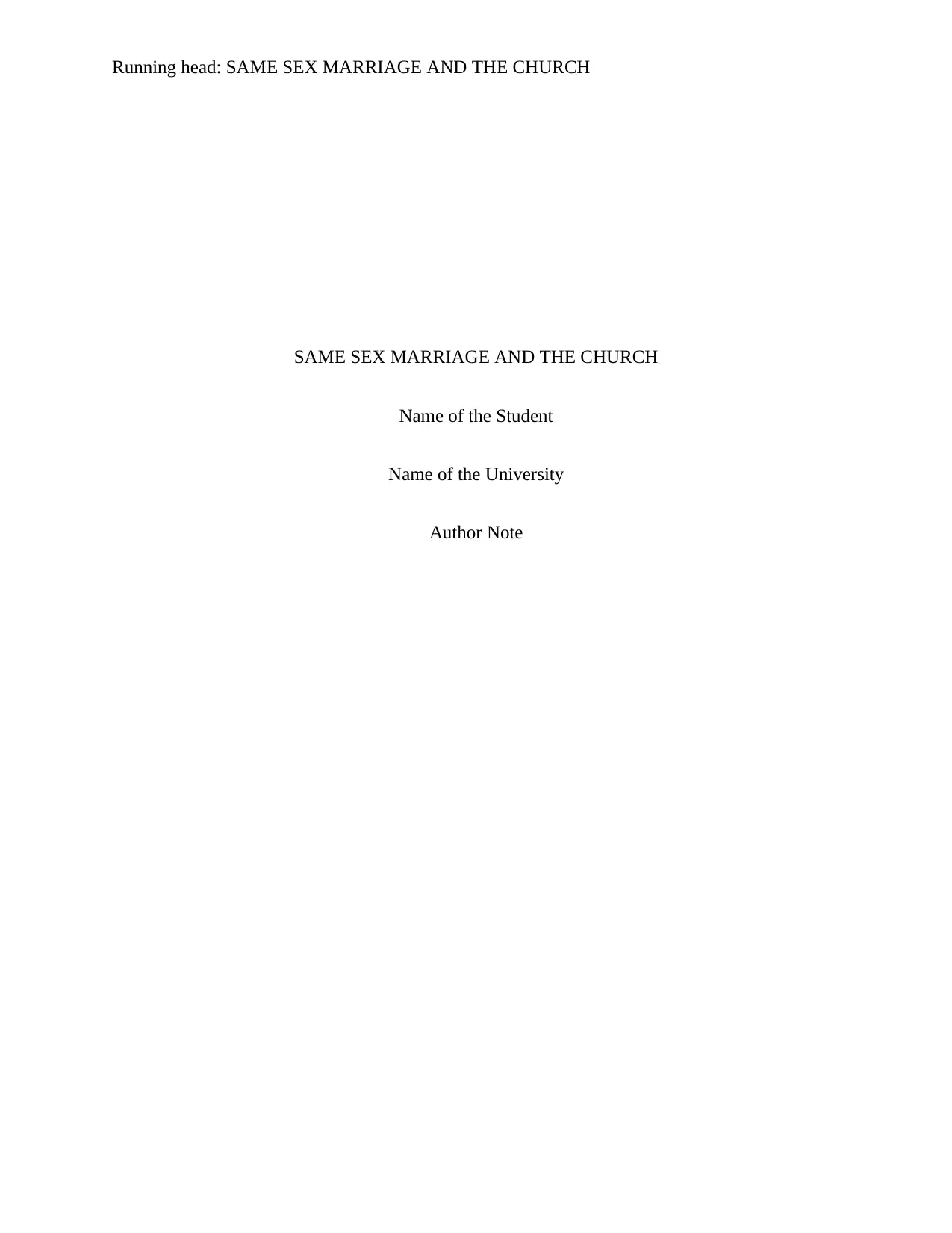
Running head: SAME SEX MARRIAGE AND THE CHURCH
SAME SEX MARRIAGE AND THE CHURCH
Name of the Student
Name of the University
Author Note
SAME SEX MARRIAGE AND THE CHURCH
Name of the Student
Name of the University
Author Note
Paraphrase This Document
Need a fresh take? Get an instant paraphrase of this document with our AI Paraphraser
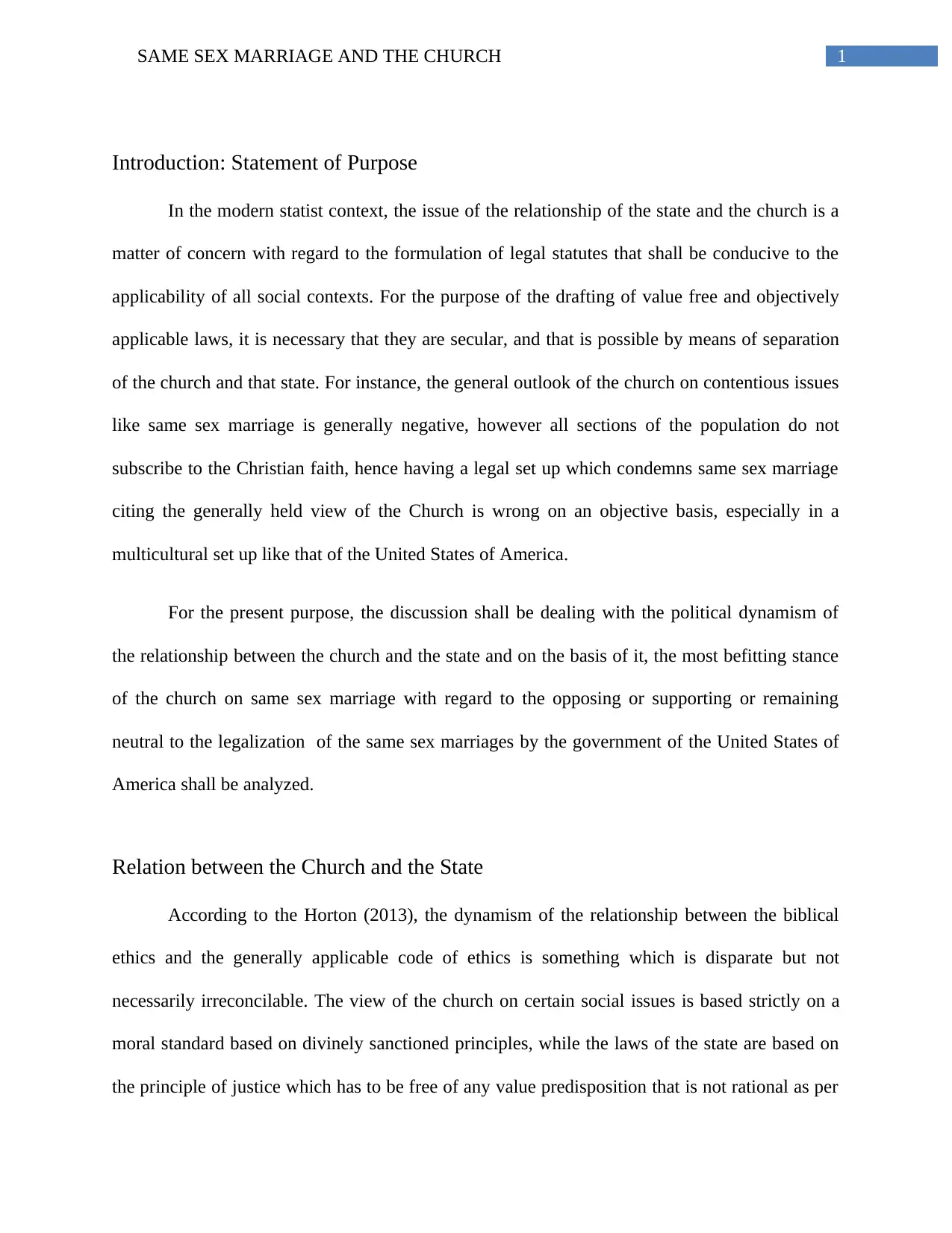
1SAME SEX MARRIAGE AND THE CHURCH
Introduction: Statement of Purpose
In the modern statist context, the issue of the relationship of the state and the church is a
matter of concern with regard to the formulation of legal statutes that shall be conducive to the
applicability of all social contexts. For the purpose of the drafting of value free and objectively
applicable laws, it is necessary that they are secular, and that is possible by means of separation
of the church and that state. For instance, the general outlook of the church on contentious issues
like same sex marriage is generally negative, however all sections of the population do not
subscribe to the Christian faith, hence having a legal set up which condemns same sex marriage
citing the generally held view of the Church is wrong on an objective basis, especially in a
multicultural set up like that of the United States of America.
For the present purpose, the discussion shall be dealing with the political dynamism of
the relationship between the church and the state and on the basis of it, the most befitting stance
of the church on same sex marriage with regard to the opposing or supporting or remaining
neutral to the legalization of the same sex marriages by the government of the United States of
America shall be analyzed.
Relation between the Church and the State
According to the Horton (2013), the dynamism of the relationship between the biblical
ethics and the generally applicable code of ethics is something which is disparate but not
necessarily irreconcilable. The view of the church on certain social issues is based strictly on a
moral standard based on divinely sanctioned principles, while the laws of the state are based on
the principle of justice which has to be free of any value predisposition that is not rational as per
Introduction: Statement of Purpose
In the modern statist context, the issue of the relationship of the state and the church is a
matter of concern with regard to the formulation of legal statutes that shall be conducive to the
applicability of all social contexts. For the purpose of the drafting of value free and objectively
applicable laws, it is necessary that they are secular, and that is possible by means of separation
of the church and that state. For instance, the general outlook of the church on contentious issues
like same sex marriage is generally negative, however all sections of the population do not
subscribe to the Christian faith, hence having a legal set up which condemns same sex marriage
citing the generally held view of the Church is wrong on an objective basis, especially in a
multicultural set up like that of the United States of America.
For the present purpose, the discussion shall be dealing with the political dynamism of
the relationship between the church and the state and on the basis of it, the most befitting stance
of the church on same sex marriage with regard to the opposing or supporting or remaining
neutral to the legalization of the same sex marriages by the government of the United States of
America shall be analyzed.
Relation between the Church and the State
According to the Horton (2013), the dynamism of the relationship between the biblical
ethics and the generally applicable code of ethics is something which is disparate but not
necessarily irreconcilable. The view of the church on certain social issues is based strictly on a
moral standard based on divinely sanctioned principles, while the laws of the state are based on
the principle of justice which has to be free of any value predisposition that is not rational as per
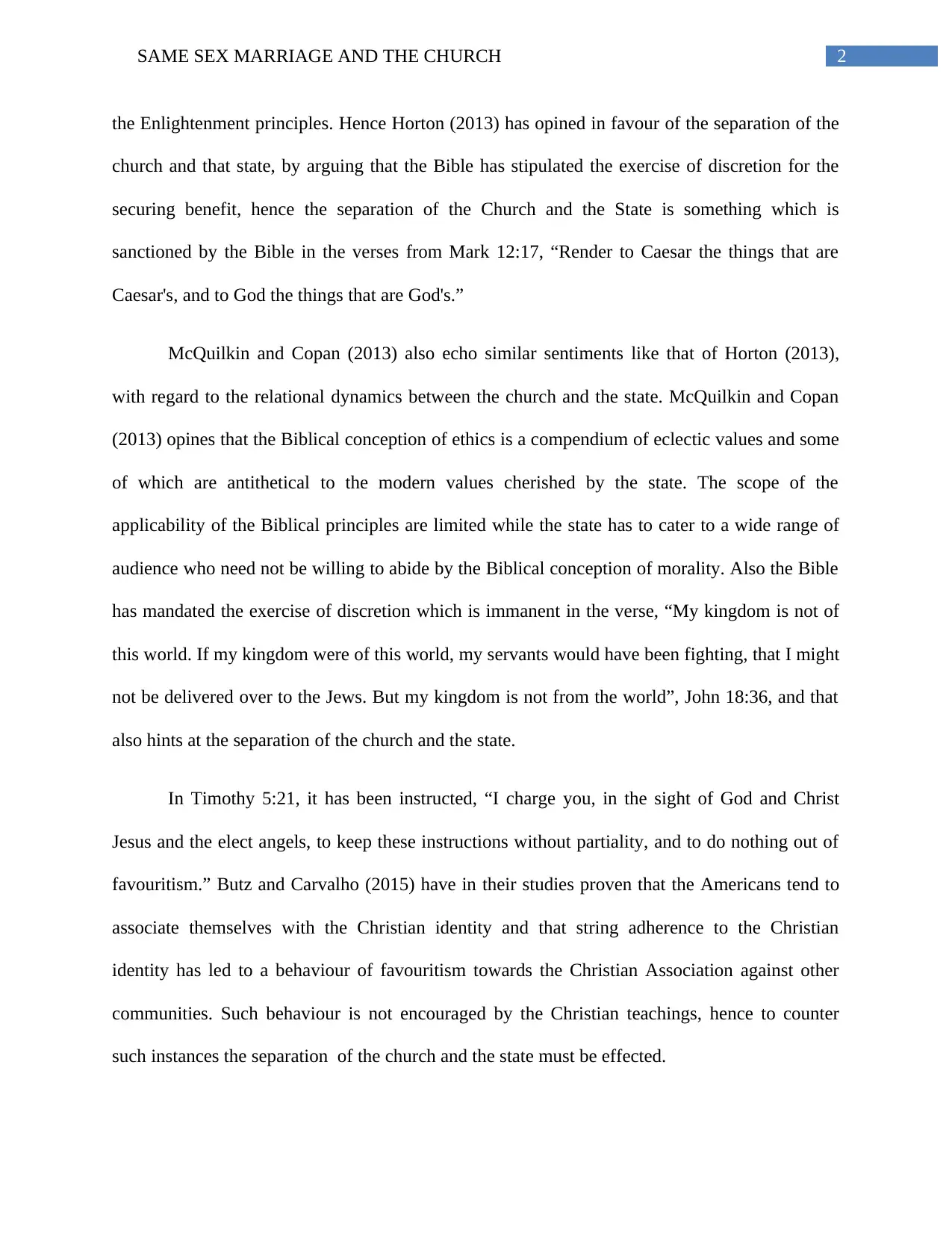
2SAME SEX MARRIAGE AND THE CHURCH
the Enlightenment principles. Hence Horton (2013) has opined in favour of the separation of the
church and that state, by arguing that the Bible has stipulated the exercise of discretion for the
securing benefit, hence the separation of the Church and the State is something which is
sanctioned by the Bible in the verses from Mark 12:17, “Render to Caesar the things that are
Caesar's, and to God the things that are God's.”
McQuilkin and Copan (2013) also echo similar sentiments like that of Horton (2013),
with regard to the relational dynamics between the church and the state. McQuilkin and Copan
(2013) opines that the Biblical conception of ethics is a compendium of eclectic values and some
of which are antithetical to the modern values cherished by the state. The scope of the
applicability of the Biblical principles are limited while the state has to cater to a wide range of
audience who need not be willing to abide by the Biblical conception of morality. Also the Bible
has mandated the exercise of discretion which is immanent in the verse, “My kingdom is not of
this world. If my kingdom were of this world, my servants would have been fighting, that I might
not be delivered over to the Jews. But my kingdom is not from the world”, John 18:36, and that
also hints at the separation of the church and the state.
In Timothy 5:21, it has been instructed, “I charge you, in the sight of God and Christ
Jesus and the elect angels, to keep these instructions without partiality, and to do nothing out of
favouritism.” Butz and Carvalho (2015) have in their studies proven that the Americans tend to
associate themselves with the Christian identity and that string adherence to the Christian
identity has led to a behaviour of favouritism towards the Christian Association against other
communities. Such behaviour is not encouraged by the Christian teachings, hence to counter
such instances the separation of the church and the state must be effected.
the Enlightenment principles. Hence Horton (2013) has opined in favour of the separation of the
church and that state, by arguing that the Bible has stipulated the exercise of discretion for the
securing benefit, hence the separation of the Church and the State is something which is
sanctioned by the Bible in the verses from Mark 12:17, “Render to Caesar the things that are
Caesar's, and to God the things that are God's.”
McQuilkin and Copan (2013) also echo similar sentiments like that of Horton (2013),
with regard to the relational dynamics between the church and the state. McQuilkin and Copan
(2013) opines that the Biblical conception of ethics is a compendium of eclectic values and some
of which are antithetical to the modern values cherished by the state. The scope of the
applicability of the Biblical principles are limited while the state has to cater to a wide range of
audience who need not be willing to abide by the Biblical conception of morality. Also the Bible
has mandated the exercise of discretion which is immanent in the verse, “My kingdom is not of
this world. If my kingdom were of this world, my servants would have been fighting, that I might
not be delivered over to the Jews. But my kingdom is not from the world”, John 18:36, and that
also hints at the separation of the church and the state.
In Timothy 5:21, it has been instructed, “I charge you, in the sight of God and Christ
Jesus and the elect angels, to keep these instructions without partiality, and to do nothing out of
favouritism.” Butz and Carvalho (2015) have in their studies proven that the Americans tend to
associate themselves with the Christian identity and that string adherence to the Christian
identity has led to a behaviour of favouritism towards the Christian Association against other
communities. Such behaviour is not encouraged by the Christian teachings, hence to counter
such instances the separation of the church and the state must be effected.
⊘ This is a preview!⊘
Do you want full access?
Subscribe today to unlock all pages.

Trusted by 1+ million students worldwide
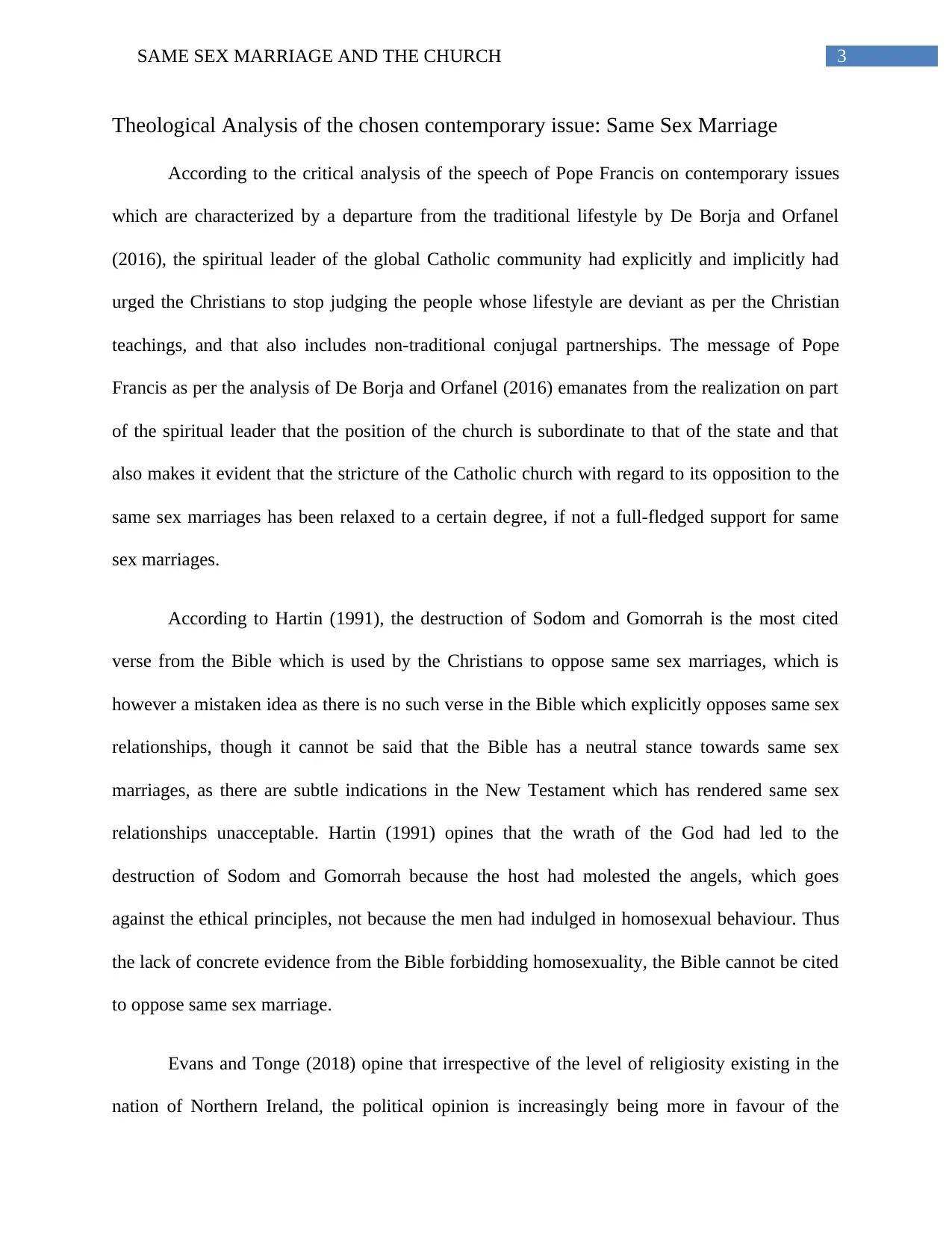
3SAME SEX MARRIAGE AND THE CHURCH
Theological Analysis of the chosen contemporary issue: Same Sex Marriage
According to the critical analysis of the speech of Pope Francis on contemporary issues
which are characterized by a departure from the traditional lifestyle by De Borja and Orfanel
(2016), the spiritual leader of the global Catholic community had explicitly and implicitly had
urged the Christians to stop judging the people whose lifestyle are deviant as per the Christian
teachings, and that also includes non-traditional conjugal partnerships. The message of Pope
Francis as per the analysis of De Borja and Orfanel (2016) emanates from the realization on part
of the spiritual leader that the position of the church is subordinate to that of the state and that
also makes it evident that the stricture of the Catholic church with regard to its opposition to the
same sex marriages has been relaxed to a certain degree, if not a full-fledged support for same
sex marriages.
According to Hartin (1991), the destruction of Sodom and Gomorrah is the most cited
verse from the Bible which is used by the Christians to oppose same sex marriages, which is
however a mistaken idea as there is no such verse in the Bible which explicitly opposes same sex
relationships, though it cannot be said that the Bible has a neutral stance towards same sex
marriages, as there are subtle indications in the New Testament which has rendered same sex
relationships unacceptable. Hartin (1991) opines that the wrath of the God had led to the
destruction of Sodom and Gomorrah because the host had molested the angels, which goes
against the ethical principles, not because the men had indulged in homosexual behaviour. Thus
the lack of concrete evidence from the Bible forbidding homosexuality, the Bible cannot be cited
to oppose same sex marriage.
Evans and Tonge (2018) opine that irrespective of the level of religiosity existing in the
nation of Northern Ireland, the political opinion is increasingly being more in favour of the
Theological Analysis of the chosen contemporary issue: Same Sex Marriage
According to the critical analysis of the speech of Pope Francis on contemporary issues
which are characterized by a departure from the traditional lifestyle by De Borja and Orfanel
(2016), the spiritual leader of the global Catholic community had explicitly and implicitly had
urged the Christians to stop judging the people whose lifestyle are deviant as per the Christian
teachings, and that also includes non-traditional conjugal partnerships. The message of Pope
Francis as per the analysis of De Borja and Orfanel (2016) emanates from the realization on part
of the spiritual leader that the position of the church is subordinate to that of the state and that
also makes it evident that the stricture of the Catholic church with regard to its opposition to the
same sex marriages has been relaxed to a certain degree, if not a full-fledged support for same
sex marriages.
According to Hartin (1991), the destruction of Sodom and Gomorrah is the most cited
verse from the Bible which is used by the Christians to oppose same sex marriages, which is
however a mistaken idea as there is no such verse in the Bible which explicitly opposes same sex
relationships, though it cannot be said that the Bible has a neutral stance towards same sex
marriages, as there are subtle indications in the New Testament which has rendered same sex
relationships unacceptable. Hartin (1991) opines that the wrath of the God had led to the
destruction of Sodom and Gomorrah because the host had molested the angels, which goes
against the ethical principles, not because the men had indulged in homosexual behaviour. Thus
the lack of concrete evidence from the Bible forbidding homosexuality, the Bible cannot be cited
to oppose same sex marriage.
Evans and Tonge (2018) opine that irrespective of the level of religiosity existing in the
nation of Northern Ireland, the political opinion is increasingly being more in favour of the
Paraphrase This Document
Need a fresh take? Get an instant paraphrase of this document with our AI Paraphraser
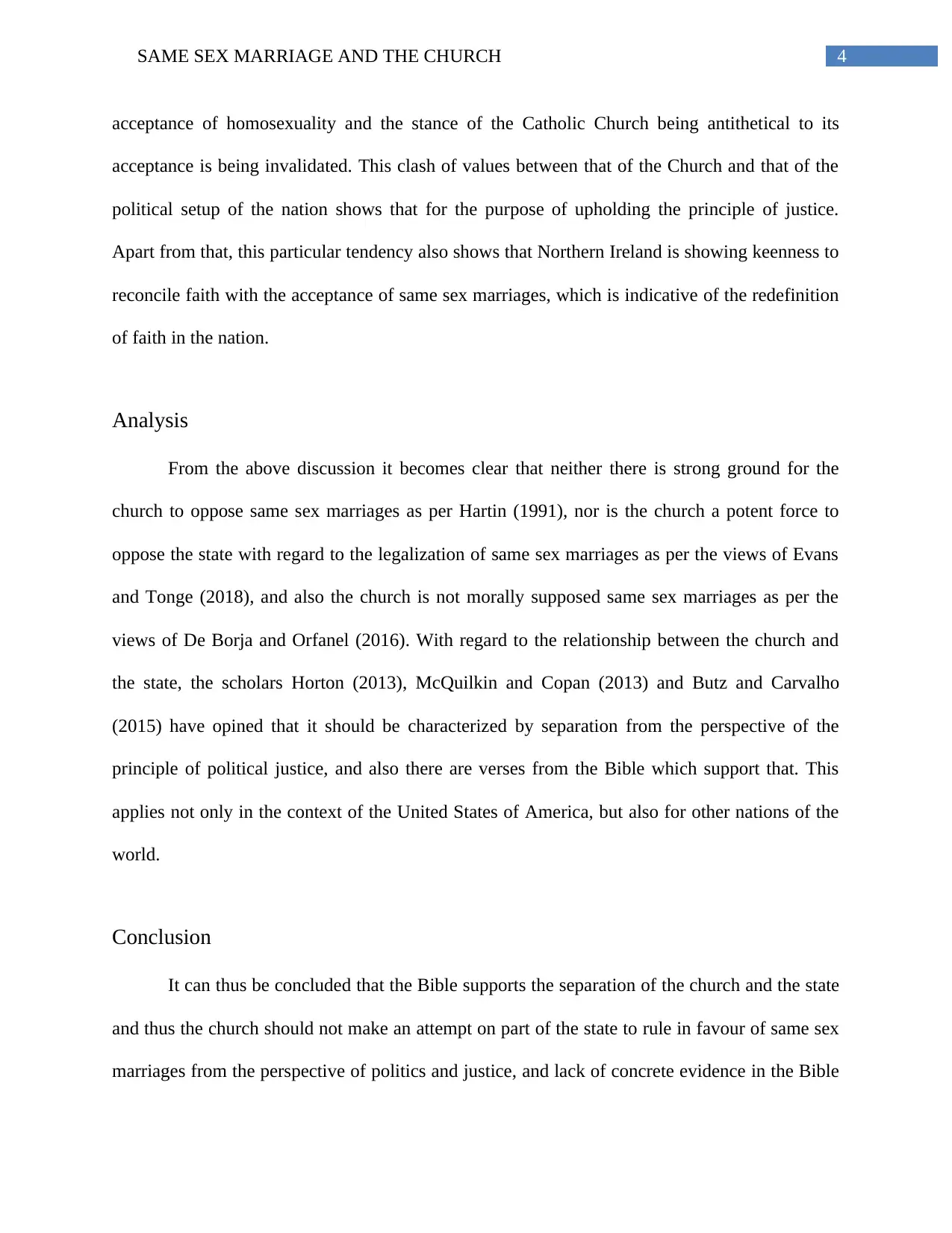
4SAME SEX MARRIAGE AND THE CHURCH
acceptance of homosexuality and the stance of the Catholic Church being antithetical to its
acceptance is being invalidated. This clash of values between that of the Church and that of the
political setup of the nation shows that for the purpose of upholding the principle of justice.
Apart from that, this particular tendency also shows that Northern Ireland is showing keenness to
reconcile faith with the acceptance of same sex marriages, which is indicative of the redefinition
of faith in the nation.
Analysis
From the above discussion it becomes clear that neither there is strong ground for the
church to oppose same sex marriages as per Hartin (1991), nor is the church a potent force to
oppose the state with regard to the legalization of same sex marriages as per the views of Evans
and Tonge (2018), and also the church is not morally supposed same sex marriages as per the
views of De Borja and Orfanel (2016). With regard to the relationship between the church and
the state, the scholars Horton (2013), McQuilkin and Copan (2013) and Butz and Carvalho
(2015) have opined that it should be characterized by separation from the perspective of the
principle of political justice, and also there are verses from the Bible which support that. This
applies not only in the context of the United States of America, but also for other nations of the
world.
Conclusion
It can thus be concluded that the Bible supports the separation of the church and the state
and thus the church should not make an attempt on part of the state to rule in favour of same sex
marriages from the perspective of politics and justice, and lack of concrete evidence in the Bible
acceptance of homosexuality and the stance of the Catholic Church being antithetical to its
acceptance is being invalidated. This clash of values between that of the Church and that of the
political setup of the nation shows that for the purpose of upholding the principle of justice.
Apart from that, this particular tendency also shows that Northern Ireland is showing keenness to
reconcile faith with the acceptance of same sex marriages, which is indicative of the redefinition
of faith in the nation.
Analysis
From the above discussion it becomes clear that neither there is strong ground for the
church to oppose same sex marriages as per Hartin (1991), nor is the church a potent force to
oppose the state with regard to the legalization of same sex marriages as per the views of Evans
and Tonge (2018), and also the church is not morally supposed same sex marriages as per the
views of De Borja and Orfanel (2016). With regard to the relationship between the church and
the state, the scholars Horton (2013), McQuilkin and Copan (2013) and Butz and Carvalho
(2015) have opined that it should be characterized by separation from the perspective of the
principle of political justice, and also there are verses from the Bible which support that. This
applies not only in the context of the United States of America, but also for other nations of the
world.
Conclusion
It can thus be concluded that the Bible supports the separation of the church and the state
and thus the church should not make an attempt on part of the state to rule in favour of same sex
marriages from the perspective of politics and justice, and lack of concrete evidence in the Bible

5SAME SEX MARRIAGE AND THE CHURCH
championing the opposition to same sex marriages in explicitly all the more discourages the use
of religion to oppose same sex couples from entering marital unions.
championing the opposition to same sex marriages in explicitly all the more discourages the use
of religion to oppose same sex couples from entering marital unions.
⊘ This is a preview!⊘
Do you want full access?
Subscribe today to unlock all pages.

Trusted by 1+ million students worldwide
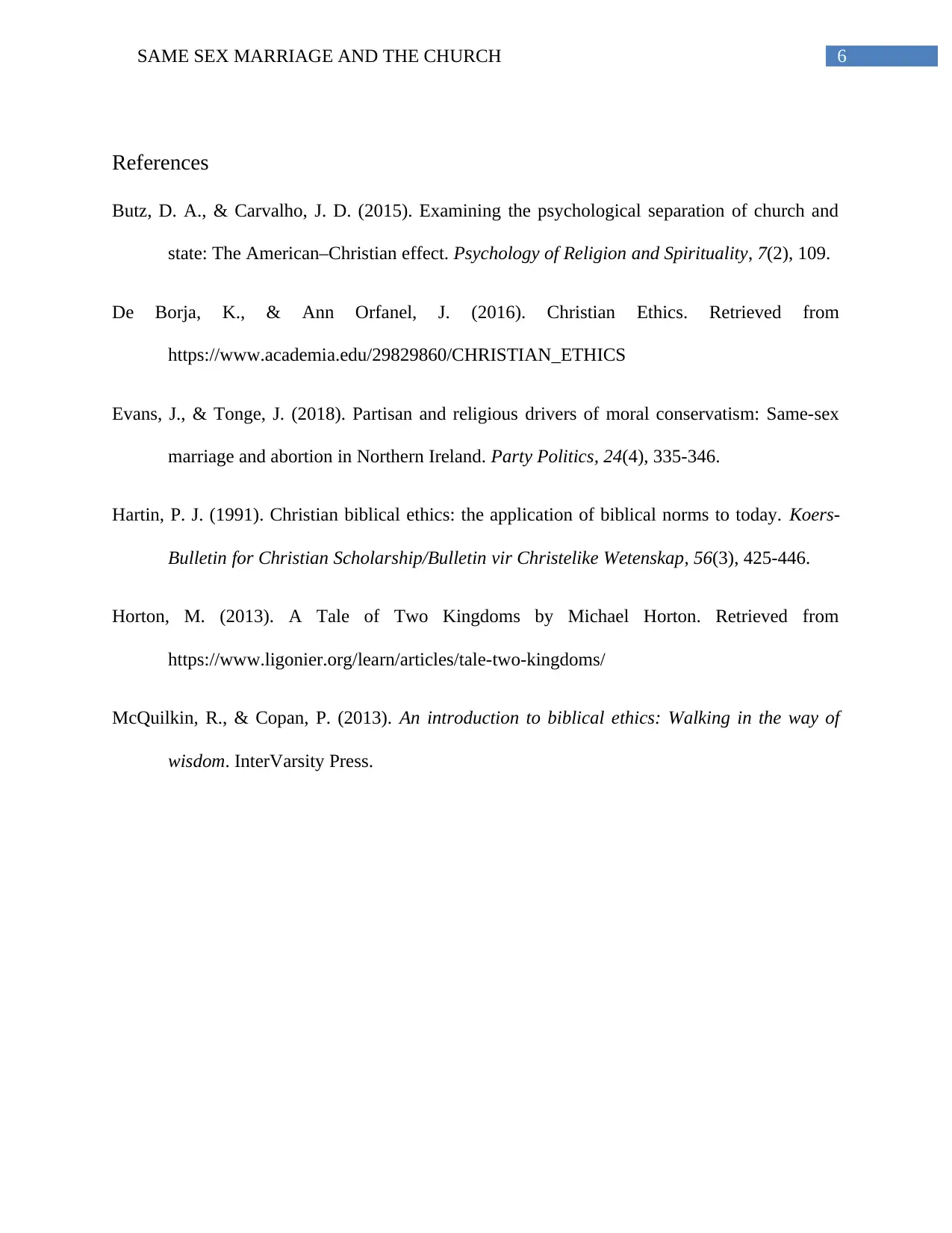
6SAME SEX MARRIAGE AND THE CHURCH
References
Butz, D. A., & Carvalho, J. D. (2015). Examining the psychological separation of church and
state: The American–Christian effect. Psychology of Religion and Spirituality, 7(2), 109.
De Borja, K., & Ann Orfanel, J. (2016). Christian Ethics. Retrieved from
https://www.academia.edu/29829860/CHRISTIAN_ETHICS
Evans, J., & Tonge, J. (2018). Partisan and religious drivers of moral conservatism: Same-sex
marriage and abortion in Northern Ireland. Party Politics, 24(4), 335-346.
Hartin, P. J. (1991). Christian biblical ethics: the application of biblical norms to today. Koers-
Bulletin for Christian Scholarship/Bulletin vir Christelike Wetenskap, 56(3), 425-446.
Horton, M. (2013). A Tale of Two Kingdoms by Michael Horton. Retrieved from
https://www.ligonier.org/learn/articles/tale-two-kingdoms/
McQuilkin, R., & Copan, P. (2013). An introduction to biblical ethics: Walking in the way of
wisdom. InterVarsity Press.
References
Butz, D. A., & Carvalho, J. D. (2015). Examining the psychological separation of church and
state: The American–Christian effect. Psychology of Religion and Spirituality, 7(2), 109.
De Borja, K., & Ann Orfanel, J. (2016). Christian Ethics. Retrieved from
https://www.academia.edu/29829860/CHRISTIAN_ETHICS
Evans, J., & Tonge, J. (2018). Partisan and religious drivers of moral conservatism: Same-sex
marriage and abortion in Northern Ireland. Party Politics, 24(4), 335-346.
Hartin, P. J. (1991). Christian biblical ethics: the application of biblical norms to today. Koers-
Bulletin for Christian Scholarship/Bulletin vir Christelike Wetenskap, 56(3), 425-446.
Horton, M. (2013). A Tale of Two Kingdoms by Michael Horton. Retrieved from
https://www.ligonier.org/learn/articles/tale-two-kingdoms/
McQuilkin, R., & Copan, P. (2013). An introduction to biblical ethics: Walking in the way of
wisdom. InterVarsity Press.
1 out of 7
Your All-in-One AI-Powered Toolkit for Academic Success.
+13062052269
info@desklib.com
Available 24*7 on WhatsApp / Email
![[object Object]](/_next/static/media/star-bottom.7253800d.svg)
Unlock your academic potential
Copyright © 2020–2026 A2Z Services. All Rights Reserved. Developed and managed by ZUCOL.

